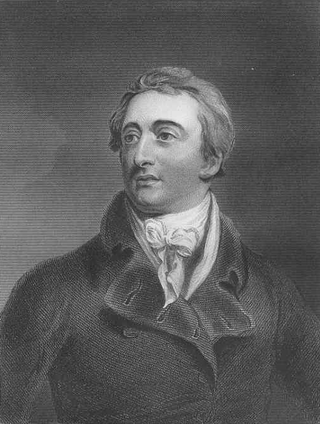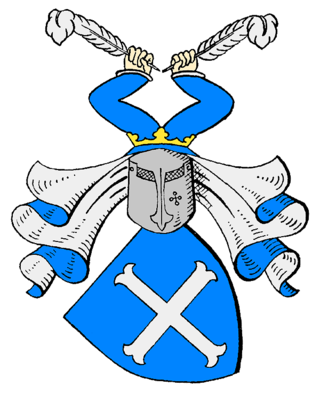Bentinck Island may refer to:
- Bentinck Island, British Columbia, an island in Canada
- Bentinck Island, Queensland, an island in Australia
- Bentinck Kyun, an island in Myanmar
Bentinck Island may refer to:

Earl of Portland is a title that has been created twice in the Peerage of England, firstly in 1633 and secondly in 1689. What proved to be a long co-held title, Duke of Portland, was created in 1716 and became extinct in 1990 upon the death of the ninth Duke, at which point the earldom passed to the most senior agnatic cousin, namely one of the 6th degree.

Lieutenant General Lord William Henry Cavendish-Bentinck, known as Lord William Bentinck, was a British soldier and statesman who served as the governor of Fort William (Bengal) from 1828 to 1834 and the first Governor-General of India from 1834 to 1835. He has been credited for significant social and educational reforms in India, including abolishing sati, forbidding women to witness the cremations on the ghats of Varanasi, suppressing female infanticide and human sacrifice. Bentinck said, "the dreadful responsibility hanging over his head in this world and the next, if… he was to consent to the continuance of this practice (sati) one moment longer." Bentinck after consultation with the army and officials passed the Bengal Sati Regulation, 1829. The challenge came from the Dharma Sabha which appealed in the Privy Council, however the ban on Sati was upheld. He reduced lawlessness by eliminating thuggee – which had existed for over 450 years – with the aid of his chief captain, William Henry Sleeman. Along with Thomas Babington Macaulay he introduced English as the language of instruction in India. Mysore was annexed under his presidency.
William Henry Cavendish-Bentinck may refer to:
Timothy Charles Robert Noel Bentinck, 12th Earl of Portland, Count Bentinck of Waldeck Limpurg,, commonly known as Tim Bentinck, is an English actor and writer, known for his long-running role as David Archer in the BBC Radio 4 series, The Archers.

Mornington Island, also known as Kunhanhaa, is an island in the Gulf of Carpentaria in the Shire of Mornington, Queensland, Australia. It is the northernmost and largest of 22 islands that form the Wellesley Islands group. The largest town, Gununa, is in the south-western part of the island.
William Bentinck may refer to:

The Bentinck family is a prominent family belonging to Dutch, German and British nobility. Its members have served in the armed forces and as ambassadors and politicians, including as Governor General of India and as Prime Minister of the United Kingdom. The family is related to the British royal family through the maternal Cavendish-Bentinck line of Queen Elizabeth The Queen Mother.
William Cavendish-Bentinck may refer to:
Three ships of the Royal Navy have borne the name HMS Bentinck, named in honor of John Bentinck:

Cavendish-Bentinck is a surname associated with the Dukes of Portland and their descendants. Bentinck is a Dutch surname brought to England by William Bentinck, an advisor to William III of England. Cavendish was added to the family name by Bentinck's great-grandson the 3rd Duke of Portland, who married in 1766 Lady Dorothy Cavendish, daughter of the 4th Duke of Devonshire. By a family arrangement, she was the heiress to estates which had previously belonged to the defunct Newcastle branch of the Cavendish family, including Welbeck Abbey, which became the principal seat of the Dukes of Portland. Following the death of the 9th Duke in 1990, the family name became extinct.
Charles Bentinck may refer to:
Lord Bentinck may refer to:
George Bentinck may refer to:
Bentinck may refer to:
Bentinck Kyun is an island in the Mergui Archipelago, Burma (Myanmar). It lies 14 km west of Letsok-aw Kyun in the Andaman Sea. Bentinck has a very irregular indented shape. The island is thickly wooded and its area is 78 km2.

George Augustus Frederick Cavendish-BentinckPC JP, known as George Bentinck and scored in cricket as GAFC Bentinck, was a British barrister, Conservative politician, and cricketer. A member of parliament from 1859 to 1891, he served under Benjamin Disraeli as Parliamentary Secretary to the Board of Trade from 1874 to 1875 and as Judge Advocate General from 1875 to 1880.

The South Wellesley Islands is an island group and locality in the Gulf of Carpentaria within the Shire of Mornington, Queensland, Australia. The group is separate from the Wellesley Islands.
Lord Edward Charles Cavendish-Bentinck, known as Lord Edward Bentinck, was a British politician who sat in the House of Commons from 1766 to 1802.
The Kaiadilt are an Aboriginal Australian people of the South Wellesley group in the Gulf of Carpentaria, Queensland, Australia. They are native to Bentinck Island, but also made nomadic fishing and hunting forays to both Sweers and Allen Islands. Most Kaiadilt people now live on Mornington Island.
Elizabeth Cavendish-Bentinck was an American born member of the Livingston family who married a British Member of Parliament from the Cavendish-Bentinck family and was a prominent member of New York Society during the Gilded Age.